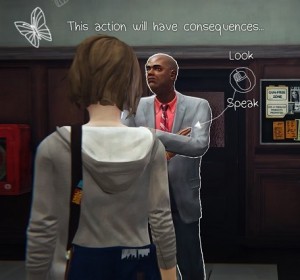My post for today was going to be specifically about Evan Narcisse’s article that talked about video games’ blackness problem, but as I sit down to write I find that it is only going to be tangentially connected.
Video games do have a blackness problem…and so do video game players. So let me explain. Narcisse is right that Black folks in video games are still stereotypically portrayed as something out of bad blaxploitation films. I won’t go into this too much right here because I have talked about it on NYMG before, so go back and check out my posts on Saint’s Row, Grand Theft Auto, and Deus Ex: Human Revolution (among others). It doesn’t go away and sadly, it doesn’t seem to be getting any better.
 Yesterday Pea and I had the treat of her being my assistant at work (thanks to subzero temperatures). As we walked around my games narratives class watching people play games and chatting about connections between what they were playing and the books that we are reading for class, we came upon a group of folks playing Indigo Prophecy. We talked about the representation of one of the game’s three protagonists, Tyler Miles, a Black man who dresses like a bad throwback from the 70s and even has what appears to be black velvet paintings on the walls of his apartment (the original game was released in 2005 and this version was the newly remastered 2015 version). We kind of summed it up as “clearly, game designers think that Black folks are stuck in the 70s” (at best) and the voice of reason came from Pea who looked at us, thoroughly confused, and said “Mama, you’re Black and you’re not stuck in the 70s!”. We all laughed, adding to her confusion, but it was one of those laugh to keep from crying moments. Pea missed the sarcasm, but drove home a point for me. People ask me all the time why I keep writing about and researching race and gender in video games and the video game industry. Why would anyone want to work in an area that is so filled with racism, sexism, homophobia, and misogyny. And yesterday really summed it up for me. My daughter, my kiddo, my baby loves to play video games and will most likely be a gamer for many years to come. Why should she have to look at shoddy representations of women, queer folks, and people of color? Why should she have to see something portrayed that is not only offensive, but completely inaccurate? Why should Tyler be dressed like a pimp on casual Friday in 2005 or 2015?
Yesterday Pea and I had the treat of her being my assistant at work (thanks to subzero temperatures). As we walked around my games narratives class watching people play games and chatting about connections between what they were playing and the books that we are reading for class, we came upon a group of folks playing Indigo Prophecy. We talked about the representation of one of the game’s three protagonists, Tyler Miles, a Black man who dresses like a bad throwback from the 70s and even has what appears to be black velvet paintings on the walls of his apartment (the original game was released in 2005 and this version was the newly remastered 2015 version). We kind of summed it up as “clearly, game designers think that Black folks are stuck in the 70s” (at best) and the voice of reason came from Pea who looked at us, thoroughly confused, and said “Mama, you’re Black and you’re not stuck in the 70s!”. We all laughed, adding to her confusion, but it was one of those laugh to keep from crying moments. Pea missed the sarcasm, but drove home a point for me. People ask me all the time why I keep writing about and researching race and gender in video games and the video game industry. Why would anyone want to work in an area that is so filled with racism, sexism, homophobia, and misogyny. And yesterday really summed it up for me. My daughter, my kiddo, my baby loves to play video games and will most likely be a gamer for many years to come. Why should she have to look at shoddy representations of women, queer folks, and people of color? Why should she have to see something portrayed that is not only offensive, but completely inaccurate? Why should Tyler be dressed like a pimp on casual Friday in 2005 or 2015?
 Last night as we recorded our 95th episode of the podcast and talked about Life is Strange another issue of Blackness hit me like a ton of bricks. Someone asked how many of the podcasters had chosen to report a student to the school authorities and while some people had and some hadn’t in the end everyone except for me had considered it. And then I thought about why…I specifically remember thinking that being a “snitch” in this game was probably going to end badly and that I could probably fix things better than an ineffectual administrator, but most importantly I remember thinking that the authorities never help you so that would be a waste of time. As we talked about it last night and I began to process I realized that my choice had nothing to do with the game and everything to do with me as a person, and more specifically a person of color. While non-minority parents get to teach their children to go to the police if ever they need help, minority parents have to teach their children to steer clear of the police whenever possible because the possibility for things to go horribly wrong is extremely high and possibility of actually getting any help is almost non-existent (and in the end not worth the risk).
Last night as we recorded our 95th episode of the podcast and talked about Life is Strange another issue of Blackness hit me like a ton of bricks. Someone asked how many of the podcasters had chosen to report a student to the school authorities and while some people had and some hadn’t in the end everyone except for me had considered it. And then I thought about why…I specifically remember thinking that being a “snitch” in this game was probably going to end badly and that I could probably fix things better than an ineffectual administrator, but most importantly I remember thinking that the authorities never help you so that would be a waste of time. As we talked about it last night and I began to process I realized that my choice had nothing to do with the game and everything to do with me as a person, and more specifically a person of color. While non-minority parents get to teach their children to go to the police if ever they need help, minority parents have to teach their children to steer clear of the police whenever possible because the possibility for things to go horribly wrong is extremely high and possibility of actually getting any help is almost non-existent (and in the end not worth the risk).
I listened as my friends and fellow podcasters talked about their decisions and I slowly realized that they were speaking from a position of privilege and didn’t even realize it. Let me stop to say this: privilege isn’t a good thing or a bad thing, it just is. It’s what you do with that privilege that makes it a positive or a negative. Folks can’t help that they have privilege. They are born with it or gain it later in life through other means. My daughter was born with a kind of privilege that I can never have and through years of education and dumb luck I have gained a little of my own, but it still does not shield me from what some will always see as the stigma of my brown skin.
For me reporting the student in question wasn’t a choice for Max to make, it was a choice for brown, raised in large urban city me and to be perfectly honest it was never really a choice at all. I didn’t think about it. Didn’t consider it. Didn’t muse over it. Just “knew” that it wasn’t a thing to do. So I didn’t. The negative possibilities were just far too great. This was a new manifestation of the blackness problem and one that is always already there in choice based games. What if who I am as a person, as a gamer, removes choice for me?
As Life is Strange goes on if I am Max and Max is me she is really in a world of trouble…in the game.





12 thoughts on “Strangely Privileged: The Blackness Problem with Gamers”
I’m glad you wrote about this after that conversation — I was thinking about it this morning, especially in light of the outpourings on social media post-Ferguson and related protests. I’ve learned a lot from listening to those discussions, and I think we need to talk about how to expand those options in games like this, to really open up the narrative (and to expand impact of story) for a more inclusive experience.
I can definitely understand the criticism of Tyler Miles today…but I remember playing IP when it was released and how liberating it was to be a playable Black character in a videogame, even with the stereotypes. 2005 saw the introduction of Kratos (who’s always going to be dude from Living Single in my mind) and the flawed-but-wonderful Jade Empire, as well as the problematic True Crime: New York. 2004 was Riddick (don’t laugh) and Def Jam: Fight for NY (i’d add Killzone, but Rico didn’t get lines until KZ2). None of those came close to the narrative development that David Cage provided for Tyler Miles.
As problematic as Tyler was, he was more developed than any Black character i’d seen in a minute: he wasn’t a sidekick, he didn’t disavow his blackness, and he was an authority figure with professional ethics. From 2015, the portrayal looks hackneyed, but IMO the only video game Black character that has come close to Tyler’s representation of Blackness has been Lee from the Walking Dead. Nilin from Remember Me would count, if there was some acknowledgement of her racial background…but there isn’t.
Andre. thanks for the comment. I remember IP in 2005 (as) well. Tyler was a well developed character (even though he shared the role of protagonist). David Cage has always been damned good at what he does, but Tyler as a character was limited then and now.
I’m interested in how you see characters like Lee and Nilin as being representative of Blackness. I like the fact that as characters they are just Black. Lee has issues/experiences that stem from the fact that he is Black, but that fact never actually gets explored. And that was definitely a missed opportunity.
I think that Lee is extremely well developed (as opposed to Clementine) in that his blackness is articulated through implicit signs, rather than explicit ones, where Tyler is ‘out’ in his blackness, for good and for ill, Lee’s blackness is revealed through references to his past. More specifically, I’m referring to the episode where they took refuge in his parents drugstore. I’m sure a lot of folk just kinda dismissed the backstory to focus on interactions between characters, but as a black academic with southern roots, lee’s family was at once ‘normal’ AND fantastic to see in a video game. Torque and Riddick were first and foremost violent men, who also had a ethical core revolving around kinship ties. Lee, on the other hand, is a nerd from a middle class black family who is forced to become a hero. You don’t get to see that ever in media, much less video games, The most recent example I can think of is M.A.N.T.I.S, or maybe Joe Morton’s character on Eureka.
Nilin is more of a stretch, I’ll admit. After writing about Resident Evil 5, I became sort of fascinated with the African and Caribbean francophone countries. So perhaps I’m overlaying my love of negritude on Remember Me, but Dontnod totally did not have to choose a heroine of color to be French. That they did, even without giving us much else to go on, won me over.
Also, I’ve been planning to write about Aveline and Adewale (AssCreed) forever, but the boringness of the games keeps sidetracking me.
DontNod has been strangely impressive when it comes to diversity. I do see where you are coming from with Lee as a Black character and his simultaneous “normalcy” and the underlying thought that his Blackness may have just gotten him railroaded (or is that just the conspiracy theorist in me?)
Ironically, I have had a piece about Aveline sketched out for a while but just haven’t had the inclination to play through the game from the beginning again (the Vita that I played the first half of the game on was stolen). Perhaps one day soon I will suck it up and just get it done!
I would like to mention that Lee from the walking dead video game was one of the best representations of a black character in a video game. Sure he was a convict, but he was a professor and his was a crime of passion. They didn’t bottle him into a petty criminal stereotype or try to make him overtly a Re skin of a white character. He was original and believable.
Wow – great insight, and totally informs how “just play a girl character” isn’t an option for me as a gay guy in story-based games with (always only hetero, except for that one token NPC way off in optional content) romantic content. “Just play like you aren’t gay.” I can’t. I’ve been gay my whole life, that’s not going to change. I just hope game dev culture can.
Let’s add this to the conversation: http://nkjemisin.com/2015/02/a-world-in-which-race-matters/
I haven’t played any of the Dragon Age games, so I can’t really comment…but her descriptions of the ‘skinning’ of Vivienne sound like some concerns that I’ve had with other brown NPCs.
Yes!! The generic (lowercase b) blackness. Where does this come from? A lack of understanding of diversity within the diaspora or from simply not giving a damn?
I have only played a couple of hours of Inquisition, but it is definitely something that I want to get into more. Especially now!
Your experience vs. Max’s privilege really rang true to me. I haven’t played Life is Strange yet. (I really want to, but I don’t have the finds at the moment.) However, I remember playing as Lee and repeatedly dodging questions about where I was when everything went to hell. As a Latino male playing as a black man, I sure as hell was NOT going to tell people i was in the back of a police cruiser, handcuffed and waiting to spend time in jail.
That really bothered me, too. I knew the game was pushing me toward “honesty,” but there’s no real-world benefit in revealing that information.